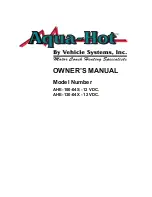
Rev 26.0/4-13
9
MRT4-DC: #35070
O
PERATING
E
NVIRONMENT
The operator must determine whether the lifter is intended to be used in each work environment,
in accordance with the following restrictions:
WARNING: Never use lifter in dangerous environments.
• This lifter is not intended for use in any environment that is inherently dangerous to the
operator or likely to compromise the lifter's ability to function. Environments containing
explosives, caustic chemicals and other dangerous substances must be avoided when using
the lifter.
• The lifter's work environment is limited by the Operating Elevation and Operating Temperatures
indicated in SPECIFICATIONS.
• The lifter's work environment must be free of metal particles or any other contaminates that
could damage lifter components through airborne contact or any other means of transmission
in the environment. If such contaminates cause a vacuum pump failure, they could result in a
load release and possible injury to the operator or others nearby.
WARNING: Environmental contaminates could result in vacuum pump failure.
• Using the lifter in wet environments may require the operator to take special precautions:
Moisture on contact surfaces of the load or vacuum pads diminishes the lifter’s slip resistance,
thereby reducing the lifting capacity (see MAINTENANCE: V
ACUUM
P
AD
M
AINTENANCE
: Friction
Coefficient).
WARNING: Moisture reduces slip resistance of vacuum pads.
Although the lifter's exterior surfaces can tolerate some exposure to water vapor, they are not
designed to be water-tight. Submerging the lifter or using it in rain may damage lifter
components; these and similar conditions must be avoided.
•
!!-CE-!!
If the lifter is employed in a construction area, CE Standard EN 13155 requires the
use of a secondary positive holding device, such as a sling system, designed to support
the load in case of a vacuum system failure.
WARNING: Where CE Standards apply, secondary positive holding device is
required for lifting loads in construction zones.
D
ISPOSAL OF THE
L
IFTER
After the vacuum lifter has reached the end of its service life, you must dispose of the lifter in
compliance with all local codes and regulatory standards that are relevant for the geographical
region.
Note: This lifter is equipped with a battery, which may be subject to special disposal regulations.
Summary of Contents for MRT411LDC
Page 2: ......












































